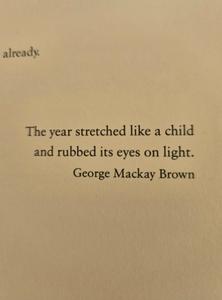Winter mornings are made of steel; they have a metallic taste and sharp edges. On a Wednesday in January, at seven in the morning, it's plain to see that the world was not made for Man, and definitely not for his comfort or pleasure.
∆ Olga Tokarczuk, Drive Your Plow Over the Bones of the Dead

I understand that pain leapfrogs over language and lands in dumb growls beyond time. A place where there is no speech and no clock, no means of separating either the moment or the misery. Nobody comes and nobody goes.
∆ Jeanette Winterson, "Gut Symmetries"
Snow had fallen. I remember music from an open window. Come to me, said the world.
∆ Louise Glück, from October in “Poems 1962-2012″
The solstice is almost upon us. There's a tradition that states that the sun is at the highest point in the inner world precisely when it's at its lowest point in the visible sky. It follows, then, that midnight on the winter solstice is the holiest time of the year. I can feel it approaching. The sun at midnight and the sun at noon touch hands through the veil for little more than an instant, but in that brief span of time they negotiate a contract. We are legally bound to this contract, as is everything upon the earth and under the earth. We are wise to keep within the bounds of this law. It is our own. The human animal is unique in its ability to deviate from its terms and conditions, though we bring about our own ruin when we do so.
∆ Damian Murphy, from “The Scourge and the Sanctuary,” Daughters of Apostasy
It was November – the month of crimson sunsets, parting birds, deep, sad hymns of the sea, passionate wind-songs in the pines.
∆ L.M. Montgomery, Anne of Green Gables (1908)
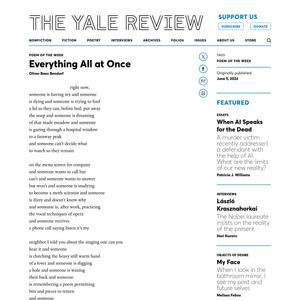
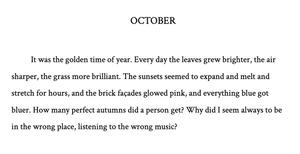
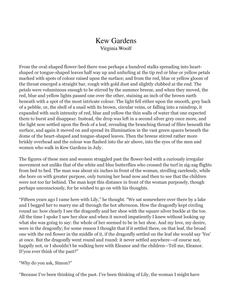
Do colors have the power to break the time barrier, and carry us into outer spaces, not only those made of miles and distances, but those of the accumulated experiences of life since its beginning or unbeginning? Color is the sign of the existence of life. Now the clouds are grandiose and turbulent. An autumn storm is coming. Whatever makes mountains rise, and us with them, makes colors restless and ecstatic.
∆ Etel Adnan, Journey to Mount Tamalpaïs (Sausalito: Post-Apollo Press, 1986), 52.


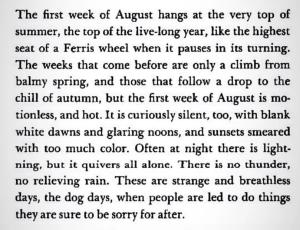


We are living in a culture entirely hypnotized by the illusion of time, in which the so-called present moment is felt as nothing but an infinitesimal hairline between an all-powerfully causative past and an absorbingly important future. We have no present. Our consciousness is almost completely preoccupied with memory and expectation. We do not realize that there never was, is, nor will be any other experience than present experience. We are therefore out of touch with reality. We confuse the world as talked about, described, and measured with the world which actually is. We are sick with a fascination for the useful tools of names and numbers, of symbols, signs, conceptions and ideas.
∆ Alan Watts




Man has wooed and won the world, and has fallen weary, and not, I think, for a time, but with a weariness that will not end until the last autumn, when the stars shall be blown away like withered leaves.
∆ W.B. Yeats, 'Ideas of Good and Evil' (1903)
In the ‘60s one either believed that America was being greened or that America was being morally defoliated. You either believed that this was the dawning of the age of Aquarius or you believed that we were on the eve of destruction.
I sometimes think that the most malignant aspect of the period was the extent to which everyone dealt exclusively in symbols. Certain artifacts were understood to denote something other than themselves, something supposedly abstract; some positive or negative moral value. And whether the artifact was positively or negatively charged depended not on any objective reality at all but on where you stood, where the polarization had thrown you.
Marijuana was a symbol. Long hair was of course a symbol, and so was short hair. Natural foods were a symbol – rice, seaweed, raw milk, the whole litany. I found myself in situations during the late ‘60s where my refusal to give my baby unpasteurized milk was construed as evidence that I must be “on the other side.”...
I next came to San Francisco at the time of the flower children, when everyone, young and not so young, was freaking out on whatever came to hand. The flower children were all up and down the Haight-Ashbury section of San Francisco—and they might have been everywhere else, too, but for the vigilance of the cops—with their long hair, their beads, their robes, their fancied resistance, and, in spite of a shrewd, hard skepticism as unnerving as it was unanswerable, really tormented by the hope of love.
The fact that their uniforms and their jargon precisely represented the distances they had yet to cover before arriving at that maturity which makes love possible, could not be considered their fault. They had been born in a society in which nothing was harder to achieve, in which perhaps nothing was more scorned and feared than the idea of the soul's maturity.
∆ James Baldwin
